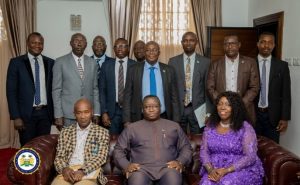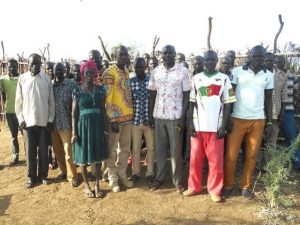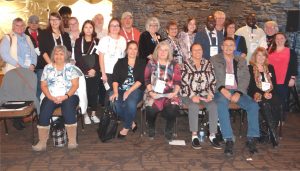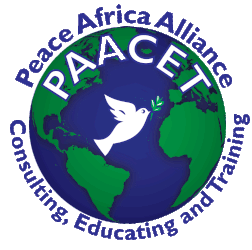Goal #16
Peace, Justice and Strong Institutions
Promote peaceful and inclusive societies for sustainable development, provide access to justice for all and build effective, accountable and inclusive institutions at all levels.
- Working to enhance prison conditions by devising improved training strategies for prisoners in order to better reintegrate them to their societies upon release
- Training of paralegals and community-based mediators
- Developing appropriate strategies for engagement in policy dialogue and advocacy for effective policy implementation at all levels
- Training in Rule of Law
- Ethics training for Leaders
- Civic education, trainings & responsibilities
- Electoral education & training
- Elections Observation
- Indigenous reconciliation practices
- Alternative Dispute Resolution
- Restorative Justice Programs
- PAACET designs and implements values-based workshops & trainings that support local communities in building capacities to overcome conflicts and engage in peacebuilding activities
- Trust-building Workshops
- Mediation services between conflicting parties, whether at the family, community, or organizational level
- PAACET utilizes its own unique form of healing and reconciliation that builds upon traditional indigenous methodologies. Fire Circle Reconciliation has been designed by PAACET to address the root causes of conflict and meet the specific needs of post conflict healing and reconciliation in large populations
PAACET Example Achievements Under Goal #16:
16.1 Strengthening Electoral Accountability and Governance (SEAG) Consortium
PAACET’s Africa Regional Director leads this important Consortium as Chair. Prior to the Sierra Leone presidential and general election in March, 2018, SEAG received funding from the National Endowment for Democracy (NED) to train and deploy 250 national and international elections observers and supervisors across the country. Also, with support from ECOWAS Commission SEAG conducted a refresher training and deployment of 20 Electoral Offenses Court (EOC) Monitors to monitor the elections offenses court proceedings in all the regional headquarter towns where the electoral courts are established.
At the end of the elections, a preliminary report was written and presented in a press briefing. Several media engagements were undertaken to report, analyse and make informed judgement about the processes.
Support to Peaceful Elections in Sierra Leone – Post-elections Community Peacebuilding engagement: ECOWAS Commission through WANEP supported PAACET to implement this project in Daru. PAACET also partnered with SLYEO to carry out pre-consultations, political dialogue forum and a football derby in Mile 91 on the same subject.
- Bomaru Peace Conference and Fire Circle Reconciliation, “Sharing Stories Heart-to-Heart”, March 22-23, 2017.
A peace conference was organised on the 23rd of March at the community court Barray. The event was attended by eminent personalities including; the Paramount Chiefs and Section Chiefs of Upper Bambara and Dea Chiefdoms, the Mano River Union, Honorable Member of Parliament, Coordinator and Chairperson of the Sierra Leone Association of Non Governmental Organisations (SLANGO), Justice and Peace Commission of the Catholic Church, National Electoral Commission, National Youth Commission of Sierra Leone, Local Unit Commander of the Sierra Leone Police, Immigration Officers from Liberia, Journalists, Civil Society, representatives from Liberia and other neighbouring communities, local chiefs, youth, women and persons with disabilities in Bomaru. The event was climaxed with live testimonies, statements and words of solidarity and courage from an incredible line-up of spiritual, political, artists, activists, change agents and community leaders. Cultural and traditional unification through prayer, honoring the faith with rituals of forgiveness. This created an amazing and pivotal moment.
The event was recognised as a powerful step and journey on the path to promote healing and indigenous reconciliation. It will remind all that such an historic event will forever feature the community of Bomaru, and other leaders must remember the common effort to bridge our differences and move the development aspirations forward. The live and in-person event was a symbol of oneness, collectivity and determination to promote peace at all costs. It also called upon all to embrace one another with open minds and hearts and go beyond divisive labels, and more so to retreat to traditional norms in order to strengthen the love for each other. The events were colourful and built a moment of hope and progress. It is expected that PAACET will continue to work with the community to ensure that this day is annually commemorated and that the socio-economic needs of the community will be enhanced through collaborative efforts. The events were climaxed with a community dance at the community court Barray.
16.3 INDEPENDENT PEACE COMMISSION FOR NATIONAL UNITY AND COHESION
Transcending conflict and moving towards the promotion of peace, human rights, justice and security, governance and the rule of law is an essential step towards sustaining national development and growth. As part of Sierra Leone’s Lome Peace Accord of 1999 the stakeholders agreed to take appropriate steps to implement the provisions of the establishment of a Commission for the Consolidation of Peace. To 2017, no government had carried through on that commitment.
On May 3, 2018 PAACET encouraged the government of Sierra Leone, through a press statement, to speedily establish the Commission for the Consolidation of Peace. In response to this call, the President, HE Julius Maada Bio committed to “the creation of an Independent Commission for Peace and National Cohesion to be established by an Act of Parliament.”
An Ad Hoc working group of 35 civil society organizations came together to design the road map for the establishment of the Independent Peace Commission. Among others, the Ad Hoc Group consists of PAACET, Peace & Conflict Department Fourah Bay College/University of Sierra Leone, Peace and Conflict Department of Milton Margai College of Education and Technology, West Africa Network for Peacebuilding (WANEP), Partners Initiative for Conflict Transformation (PICOT), and Njala University, Bo Campus.
The aim of the Adhoc Committee is to collaborate and partner with the Government of Sierra Leone and other stakeholders to promote peace and national cohesion through the establishment of the Independent Commission for Peace and National Cohesion in Sierra Leone by May 2019.
October 2018: PAACET played a leading role in facilitating the organisation of a CSO Round Table Conference in Sierra Leone on the Infrastructure for Peace (I4P), which was officially launched by the Deputy Minister of Information and Communication and statements delivered by the UNDP Resident Coordinator, WANEP and the Global Partnership for Peace and Conflict Prevention (GPPAC). The opening session which was chaired by PAACET ARD brought together representatives from civil societies across Sierra Leone, representatives from the National Peace Council of Ghana and Uganda and other representatives from Georgia and Vanuatu to share experiences and best practices. Civil Society Organisations present deliberated on the following topics: Understanding the Right to Peace; Understanding Infrastructure for Peace; Lessons and Best Practices; The Need for an Infrastructure for Peace in Sierra Leone; Strategies and Roles of CSOs/CBOs to Establish National and Regional Structures on Infrastructures for Peace; Developing a Framework for Infrastructure for Peace in Sierra Leone and Developing Follow-up Action Points and Recommendations. At the end of the two days session, PAACET ARD was unanimously elected to lead the process moving forward, engaging with UNDP on the finalised Green Paper and submitting a communique to the Government of Sierra Leone on the establishment of the peace infrastructure. The session was funded by the GPPAC, Netherland and facilitated by WANEP regional office in Ghana.
16.4 PAACET IS MEMBER OF AFRICAN PEER REVIEW MECHANISM (APRM): Headline 28 January 2020: The Natioinal Governing Council of the African Peer Review Mechanism, APRM, paid a courtesy call on His Excellency President Dr. Julius Maada Bio, and praised him for maintaining good governance in the country. Presenting the team to the President, the Executive Secretary for the APRM, Dr. Charles Joezie Silvia, said they had mutually agreed on the instrument that was voluntarily acceded to by member states of the African Union as a self-monitoring mechanism. Dr. Silvia said that APRM was founded in 2003, and Sierra Leone joined it in 2003 with the mandate of encouraging conformity with regards to political, economic and corporate governance values, codes and standards, among African countries. He added that the objective around socio-economic development was also to ensure monitoring and evaluation of AU Agenda 20063 and SDGs 2030.
[PAACET ARD Mr. Charles B.P. Lahai is Chair of the Sierra Leone APRM Committee]

16.6 SOUTH SUDAN ALOHA-HITA PROJECT
The Aloha-Hita Project is a Healing & Reconciliation Training Project in Eastern Equatoria of South Sudan. It is designed to bring together two perennially conflicting tribes, the Didinga and the Toposa in numerous villages throughout the region. Work is currently underway to complete an access road to the existing Maji Peace Centre located in the centre of the two opposing tribes’ traditional areas. Once completed, PAACET will offer a comprehensive training program in Peacebuilding techniques, followed by daily Fire Circle Reconciliations at the end of each day. We are grateful for funds donated by the local Canadian community who are supporting the workers back home to complete the road. 
Further funding strategies continue in an effort to bring the next stages of this important program to fruition.
16.7 Fire Circle Reconciliation:
PAACET Board Members Karen Huggins, Augustino Lucano and Janyce Konkin presented a Role Play workshop about our Fire Circle Reconciliation at the National Restorative Justice Symposium in Banff, Alberta on Monday, November 18th, 2019. We were grateful for the participation of two South Sudanese volunteers from Calgary who helped to present the authentic cultural perspectives (Nyabuoy Gatbel and Jilasio Lokuawii). Our purpose was to introduce the ongoing trauma that current Canadian policies inflict upon many immigrant communities that perpetuate the same traumas inflicted on First Nations communities for the past 150+ years. It is time for policies to change. If we are to be a leader of nations in multiculturalism we must encourage integration over assimilation, and we must truly be inclusive and develop policies that honour all traditions, all cultures. The workshop was very well received, despite its 75 minutes limited timeframe.
